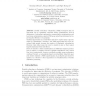Free Online Productivity Tools
i2Speak
i2Symbol
i2OCR
iTex2Img
iWeb2Print
iWeb2Shot
i2Type
iPdf2Split
iPdf2Merge
i2Bopomofo
i2Arabic
i2Style
i2Image
i2PDF
iLatex2Rtf
Sci2ools
121
click to vote
EUROPAR
2003
Springer
2003
Springer
Partial Redundancy Elimination with Predication Techniques
Partial redundancy elimination (PRE) techniques play an important role in optimizing compilers. Many optimizations, such as elimination of redundant expressions, communication optimizations, and load-reuse optimizations, employ PRE as an underlying technique for improving the efficiency of a program. Classical approaches are conservative and fail to exploit many opportunities for optimization. Therefore, new PRE approaches have been developed that greatly increase the number of eliminated redundancies. However, they either cause the code to explode in size or they cannot handle statements with side-effects. First, we describe a basic transformation for PRE that employs predication to achieve a complete removal of partial redundancies. The control flow is not restructured, however, predication might cause performance overhead. Second, a cost-analysis based on probabilistic data-flow analysis decides whether a PRE transformation is profitable and should be applied. In contrast to oth...
Related Content
| Added | 06 Jul 2010 |
| Updated | 06 Jul 2010 |
| Type | Conference |
| Year | 2003 |
| Where | EUROPAR |
| Authors | Bernhard Scholz, Eduard Mehofer, R. Nigel Horspool |
Comments (0)

